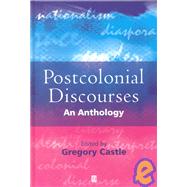Postcolonial Discourses An Anthology
, by Castle, Gregory- ISBN: 9780631210047 | 0631210040
- Cover: Hardcover
- Copyright: 2/8/2001
This ground-breaking collection of postcolonial discourses takes a region-by-region approach to postcolonial theory, giving a sense of the heterogeneity of postcolonial studies. The development of postcolonial studies is inextricably tied to specific geographical, social, and historical conditions. Gregory Castle's regional approach emphasizes the separate development of different theories, but also enables students to compare different colonial problems and the various postcolonial theoretical solutions that have evolved in different regions. In order to give students a fuller sense of the themes and issues specific to different regions, the anthology includes essays in their entirety. An introductory section includes recent essays by seminal thinkers like Homi K. Bhabha, Gayatri Chakravorty Spivak, and Edward Said. Five sections follow that give coverage to post-colonial thought in South Asia, the Caribbean, Africa, Australia and New Zealand, and Ireland. In each of these sections, issues central to the development of postcolonial thought and its relation to colonial discourse are featured in essays by some of the most important scholars writing today. A general introduction provides the student with an overview of the issues covered in the anthology, detailing how different regions respond to the British Empire and its legacy in the post-colonial world. Though these responses spring from different kinds of problems, they are directed toward the same source of power. The continuities between and among these responses, which are detailed in headnotes for each entry, justify the existence of the so-called postcolonial moment.







